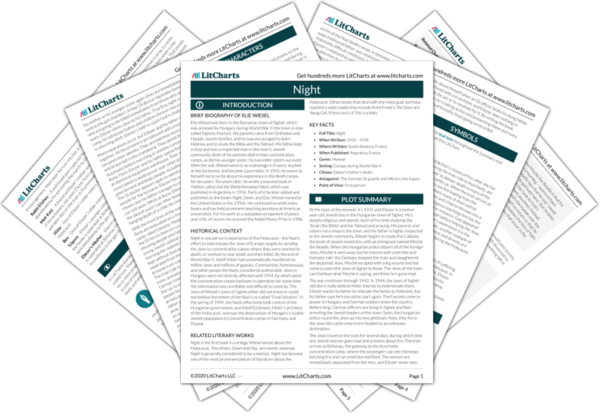As his family is being marched from its home, Eliezer sees his father weep for the first time. By the end of the book, his father is dead, another victim of the Nazi death camps. In between, Night explores the ways traditional father-son relationships break down under impossibly difficult conditions. At the heart of this theme is Eliezer's relationship with his own father. Yet the narrator also pays attention to other father-son relationships among the prisoners in the camps; his observations of other fathers and sons make him think about his duties to his own father.
In normal life, before the Holocaust began, Eliezer's father has great respect in the community and within Eliezer's house. The relationship of father to son is traditional—the biblical commandment to honor one's parents is paramount in Jewish families like Eliezer's. After the family is split up at Birkenau, Eliezer and his father have only each other to live for. As his father weakens, the traditional roles of protector and protected are reversed. It is Eliezer who must protect his father.
During their time in the camps, Eliezer time and again feels shame when he is angry at his father for not being able to avoid beatings or for not being able to march correctly. His father continues to look out for him—he gives Eliezer a few tools to keep when it looks like he will be taken away, and he rouses a neighbor to save his son when someone on the train begins to strangle Eliezer. But there's a limit to how much either can shield the other from hardship. And as conditions become more and more impossible, and the physically weaker and older begin to die, fathers become burdens—first to the consciences of sons, who feel guilty about their own survival instincts and their inability to protect their fathers, and then physical burdens, too. Eliezer sees an illustration of this in the death march to Gleiwitz when a young man leaves behind his tired father, a rabbi; and again on the train to Buchenwald, when a son kills his father while fighting for a morsel of bread. These instances of the disintegration of basic familial bonds help remind Eliezer of his love and duty to his own father. By the end of the book, though, his feelings hardly matter. Eliezer's father grows sick, doctors won't help, and Eliezer is simply unable to take care of or prevent others from harming his father.
Fathers and Sons ThemeTracker

Fathers and Sons Quotes in Night
"Where is God now?"
And I heard a voice within me answer him:
"Where is He? Here He is—He is hanging here on this gallows. . . . "
















